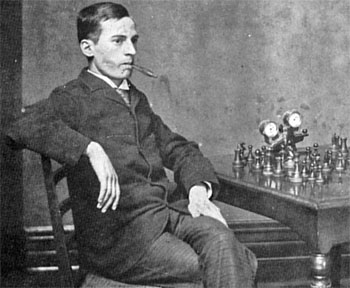
“Pillsbury has for a long time been insane, becoming violent at times through blindfold chess playing.”
A great light of the nineteenth-century chess world who burned briefly, Harry Nelson Pillsbury was a brilliant player as well as an accomplished mnemonist capable of quickly absorbing and regurgitating seemingly endless strings of facts. Pillsbury never had the opportunity to become world champion because his mental health deteriorated, the result of syphilis which he contracted in his twenties. An article in the April 9, 1906 Brooklyn Daily Eagle assigned his decline to more genteel origins. The text:
“Harry Nelson Pillsbury, the greatest chess player since the days of Paul Morphy, is to be taken from the Battle Creek Sanitarium, where he is at present, to a sanitarium at Atlantic City, N.J. Pillsbury has for a long time been insane, becoming violent at times through blindfold chess playing. The fact became known through a letter from William Penn Shipley, of the Pennsylvania Chess Association, to a friend at the Brooklyn Chess Club.
The game of blindfold chess requires intense concentration of the mind, and, according to the physicians who have been working on Pillsbury’s case, ultimately destroys the memory cells of the brain, if carried on to excess. A player is placed in a room by himself and plays the game, entirely from memory, while his opponent moves for him at the table.
One instance of Pillsbury’s remarkable skill was shown when he payed for thirteen hours, sitting all alone in the little anteroom which leads into the main rooms of the Brooklyn Chess Club. He did not stop even to eat, and bore in mind twenty-four games during that time. Blackburn and Morphy kept no more than fifteen games in their mind at once. Physicians state that the gift to play blindfold is a gift and cannot be acquired.
While Pillsbury’s case is considered practically hopeless, every effort that can be brought to bear to bring the former champion into the knowledge of the world again will be made.”
